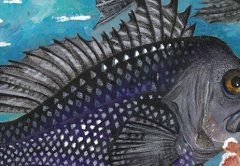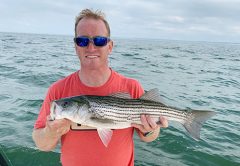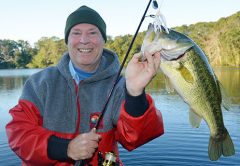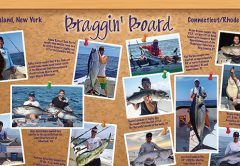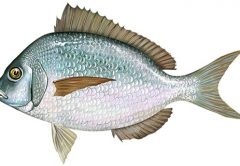by Zach Harvey
Editor’s Note: In last month’s Fish Focus, I looked at the way the evolution of our management bureaucracy has made science an increasing load-bearing, legally-required part of every regulatory decision, and some ways that has become problematic…
No amount of any observed occurrence means anything when it’s just the full-time fisherman watching it and recording it in his logbook. The known thing of 10 years isn’t a thing until you carry an authentic credentialed scientist out to see it happen. In fact, it won’t have occurred until said scientist has seen it many times, has designed a procedurally rigorous means to observe it randomly, secured grant funding to make it happen, then done it for a meaningful time set to give it PhD street cred.
Beyond the obvious appropriate ways it should serve the process, science–the required commodity–works several different ways in fisheries management. It has been used numerous times to desired political effect, when one or more states have overshot their allocations badly. Delegates from those states have used the valid argument that statistical error flattens out as the size of a sampling area grows to absorb neighboring states (and their attendant quota shortfalls) into “regional” management zones. Ostensibly the intent is to improve data quality; the real motive is to unload the punitive effects of their own poor management choices on neighboring states, with the fringe benefit of squashing the compliant states’ party/charter fleets of any trade advantage associated with looser regulations the following seasons.
The lack of science related to a given species, or a discreet population of a species, has made it legally impossible for regulators to stop the inevitable decimation of that population, even when any rational person watching the event sees it coming.
A huge rebounding population of codfish off Block Island ten years ago drew a four-state fleet for three consecutive seasons. For three seasons, regulators, who had no time to launch a study to prove the fish, which were spawning, were indeed spawning, watched, powerless, as it got demolished.
For the last several years, a shocking population explosion of black sea bass populations from Mass to Florida has created a regulatory “death spiral,” where anglers can’t get away from them, and common sense says the species is almost certainly reaching a point of abundance that is adversely impacting the health of other rebuilding stocks. That stock, for various biological reasons, has long been a source of high data variability (surrounding the gender composition, geographic distribution, etc). Between the inevitability of catching them as bycatch in other fisheries, and the fact that many people now target them because they have new opportunities to catch them, we are going well over our allocated quota. These overages/paybacks, along with the requirement that scientific uncertainty be subtracted o the top of the annual target, mean we have no legal way to take advantage of a stock that’s hugely available and could shoulder additional pressure.
Meanwhile, we’re forced to keep hammering on fluke, a stock that’s being decimated on their winter grounds offshore by the entire permitted drag fleet, NC to MA, and dumptrucked back to nearly every East Coast state from the Northeast canyons.
The rod-and-reel fleet in RI, CT, or NY have been watching their summer inshore fishery fall apart, just as it did on the 1980s, when NMFS-led research fishing discovered the huge and mostly dormant offshore populations in winter.
From the statutory perspective, the problem we’ve already borne out for three years won’t officially be a problem until the “mysterious” decline starts to appear in the the science of peer-reviewed statistics this season, next season–whatever year all the fish that migrate inshore and populate our high-summer fishery don’t make it back…
As I’ve said already various different ways, I have all the faith in the world in science. The glaring, gnawing problem here is that what the regulatory process is forced to choke down under the brand-name of science would make a scrupulous laboratory researcher, a guy who frets over the most seemingly innocuous variables on principle, would shit his pocket protector over the shenanigans being carried on the water an subsequently packaged up under the name of his fairest of academic disciplines.
According to my understanding of observation, seeing something 100 days in a row, and having the situational awareness to note and record a great many other trickier variables with a keen eye for differences–what many of the best fishermen I know do daily on our home waters–has to be worth something. Unfortunately, in the procedural terms of the current management regime, there is not one portal in the whole regulatory machine that can accept such hideously pedestrian insight. It is all just so much “anecdotal information”–until someone finds some stray Huckleberry budget hidden in the NMFS coffers, and turns some fisheries experts loose long enough to discover the five-year-old tragedy-in-progress, study it while it sinks in the ecological quicksand of five more years’ unchecked exploitation, and release a swell scholarly paper to coincide with the species’ designation as an endangered species.
That’s a slight exaggeration: there’s never stray money in the NMFS coffers.
Unfortunately, the fisherman’s end of the arrangement offers little more in the way of hope, but it should comfortably house the remainder of the blame. As much as I mean the foregoing condemnation of current management, there’s precious little equal/opposite big-picture wisdom or foresight holed up in the harbor, where rust is the new black, and the median age of the crew speaks to a proud way of life dying of attrition.
For all the indignation over “draconian regulations,” all the endless resentment over being regulated by desk jockeys and professional bureaucrats, there are precious few who ever felt a deep sense of obligation to the very sh that underwrite the livelihood.
Truth is, to paraphrase a line from one of my foremost mentors in the fishery, you’re regulated by idiots because you couldn’t find the good sense to regulate yourself–to throw back the little ones that were the future of your living. You about sunk your boat working on spawned and now you complain there are none around.
And even now that you’ve felt the hardship greed has brought down on our whole occupation, watched the business wither to a shadow of what it was, you still take the easy way out–the low road–the second you think no one’s watching.
Management will never go away if there’s one cheater. And where there’s one boat making money cheating, there’s a fleet cheating because they’re not going to let him make a dollar when they’re not.
When someone speaks out, he’s a rat, a snitch–not exactly the last word in ethics or sustainability. The worse things get, the more the ones left cannibalize the future, chase short bucks, do their damnedest to leave a “scorched ocean” in their wake.
And then I watch Kaya, who’s seven now, hold the rod the way she’s watched me do it, right down to her stance and facial expression, tongue poking out the side of her mouth, involuntarily, as she strains to catch something. She knows I want this to be a memorably good thing for her, but i get little glimpses that it’s her own, too. I owe her better than the ocean I’ve left her. No, I owe her more than glorified stories of my fishing youth, or tales about how much better everything used to be. I owe her a childhood, a future memory of easier times with Dad who, only a couple years from now, just won’t get it at all.
For the moment, I get her, which is worth so much more than anything we’ll catch today.
by Zach Harvey




